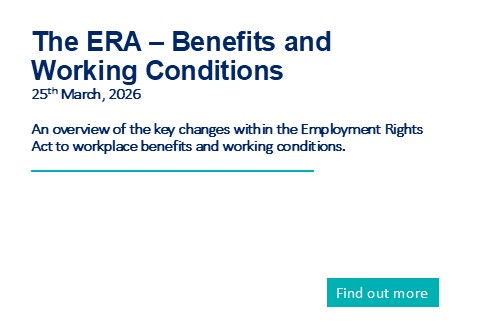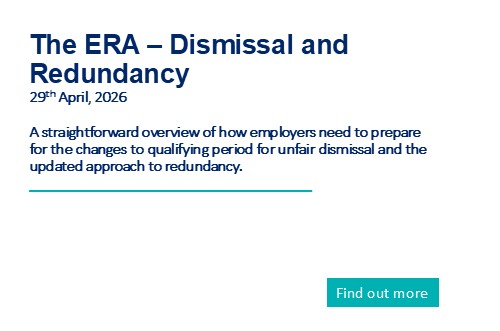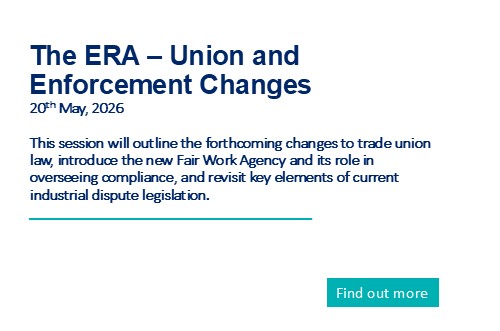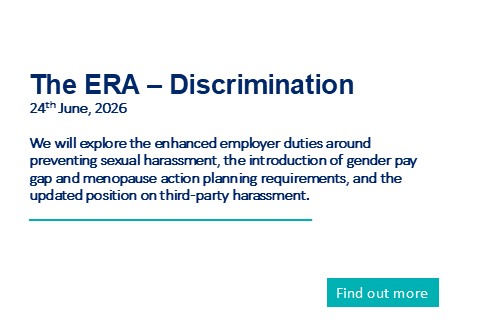- Details
The King’s Speech - What is on the Employment Law Horizon
The King’s Speech on Wednesday, 17 July, launched the plans for the new Labour Government. Whilst there is quite a lot of information to unpack in the government’s plans, David Leach lifts the lid on what to expect from an employment law perspective.
Labour set out their proposals in their election manifesto, so a number of the key proposals will not come as a surprise but will still be of keen interest to HR professionals, and we now have a clear(er) plan on what is to come in employment law.
Employment Rights Bill
Right off the bat is a new Employment Rights Bill, with the current version ERA 1996 now almost 30 years old many may argue that a review and a refresh has been overdue! This proposed bill promises to be a radical shake up of employment rights and will be key to Labour delivering its “New Deal for Working People”.
Day One Rights
Several rights which currently have some form of qualifying period of service are proposed to move to the day a worker/employee (this status is possibly up for change) starts their job.
| Right | Current Position | New position |
| Sick Pay | Qualify on 4th day of incapacity and be earning above lower earnings limit | Qualify on 1st day of incapacity. No lower earning limits |
| Parental Leave | At least 1 year’s continuous employment | Qualify on 1st day of employment |
| Parental Pay (shared parental pay) |
|
Qualify on 1st day of employment
Possibly still need to meet the earnings test |
Regrettably it appears that eligibility for Statutory Maternity Pay does not appear to be included in this proposal for day one rights alongside parental pay. It is not clear if this is deliberately omitted or if there is just a lack of clarity over the current wording.
Unfair dismissal
| Right | Current Position | New position |
| Not to be unfairly dismissed | 2 years continuous employment | Qualify on 1st day of employment (subject to probation caveat) |
The Prime Ministers Briefing Statement (“Briefing Statement”) carved out a policy caveat enabling “employers to operate probationary periods to assess new hires” what this will mean in practice will be contingent on the Bill’s drafting. At this point we understand that this will mean that day one rights will start when the employee is confirmed in post at the end of probation although that is not guaranteed.
This is not only the reversal of the 2021 change that extended the qualifying period from one to two years but is a significant improvement in employee rights but at what risk! Well organised employers should not need two years to assess the suitability of an employee so a reduction in the qualifying period appeared to be a reasonable step in managing the balance in the employment relationship. But is this proposed change too far the other way?
We suspect the acknowledgement in the Briefing Statement, that the likely impact of potentially removing entirely the qualifying of employers is underestimated.
Our greater concern is the impact on the Employment Tribunals, already overtaxed with the current caseload. Our clients already face significant delays in any Tribunal responses and lengthy waits for listings.
Whilst we agree that a well organised employer should not need two years’ service to determine if the employee is the right person for the job, removing any qualifying period is a substantial lurch in favour of employee rights in the employment relationship.
Zero Hours
From reading the Labour manifesto, we were anticipating a potential outright ban on these casual contracts. However, this is not necessarily the case. The government has set out a plan to ban exploitative zero hours contracts and a right for workers on zero hours contracts to request a more stable hours pattern.
What is meant by exploitative is yet to be known as the context is yet to be detailed. But the Briefing Statement again has provided some context, with the plan to end “one-sided flexibility” and to provide a “baseline level of security and predictability” for all jobs. We expect this to limit the right of employers to require workers to be available to work without providing a guarantee of any work or pay.
There is also a reference to establishing better notice periods of shift changes and providing compensation when a shift is cancelled or curtailed.
Normal hours contract
Workers will have the right to a contract that reflects their “normal hours”. We expect that ‘normal hours’ will be defined by the average weekly hours worked over a 12-week period.
Fire and re-hire (replace) or Dismissal and re-engagement
The plan to create a new code of practice to regulate the right to fire and re-hire will not come as a surprise. However, sadly, neither the Speech nor the Briefing Statement shed light on how this will work.
Very much watch this space, but we expect that employers will still be able to dismiss employees and offer new contracts of employment where alternatives have been exhausted and there is a clear and genuine business need for change.
Trade Union reforms
The process for recognition of unions is to be simplified. We expect that this will mean a reduction in the voting thresholds needed, which is currently 40% of those eligible to vote. So more of a change to the technicalities than anything else.
The Strikes (Minimum Service Levels) Act 2023 is likely to be repealed.
Curiously, what was missing was the proposed right of access. The proposal was to give unions the right to enter the workplace for the purpose of recruiting and organising. There is a reference in the briefing note to workers having a “reasonable right to access a union within workplaces”. But this reads as a very watered-down version of the right of access previously mooted.
Draft Equality (Race and Disability) Bill
Tucked away in the Speech was a proposed bill to extend the equal pay protection to ethnic minorities or those who are disabled.
This bill also proposes to introduce mandatory ethnic pay gap reporting and disability gap pay reporting.
Ethnic Pay Gap Reporting has been subject to a number of reviews in recent years. Whilst gender reporting is delineated on the binary male and female comparisons, all areas of the country have a healthy balance of potential male and female employees, which means that the resulting report is an effective means of assessing the companies stance on fair pay. However, creating reports based on those who are disabled, which is a complex spectrum, and race with numerous race and ethnic groupings would not only be very complicated but it might be much harder to produce a meaningful report which can be used to make meaningful comparisons and indicating true disparity rather than accidentally reporting false positive or negative outcomes.
Other policies
Additional policy developments include:
- Removal of the lower earnings limit to Statutory Sick Pay, which will go in combination with the day one right for sick pay.
- Flexible working, which has recently become a day one right to request, will become a “default” from day one. So, employees can have an expectation that there can be some flexibility in how a role is performed. How this will work in practice will yet to be seen. We expect employers will have to be able to evidence why a role cannot be worked flexibly.
- Protection against dismissal for woman for up to 6 months from the date of their return work after maternity leave. This is an enhancement on the protections against redundancy that the previous Government had brought in. Though there is indication of “special circumstances” when a dismissal can take place, but of course further details will be needed to fully understand how this will work.
- A Fair Pay Agreement for the adult social care sector.
- Fair Work Agency will be created to police and enforce workplace rights.
- School Support Staff Negotiating Body will be re-established.
Commentary on Employment Law Changes
Many of these proposals in the Speech, and further detail in the Briefing Statement, were expected as they are giving a clearer(ish) voice to what was set out in the election manifesto. But it still remains to be seen how many of these policies and changes can be enacted and bring the change they promise. The devil will very much be in the detail, and we eagerly await the publishing of the draft bills and if clarity is not there that the Government will listen to commentary and provide clarity.
This is of course an ever-developing set of information so please keep an eye out for updates or further Sharpe Minds once more information or draft legislation is published.
If you wish to read the full text of the King’s Speech it can be found here.
If you wish to read the full text of the Prime Ministers Briefing Statement it can be found here.
If you wish to discuss any of the points raised in this article, then please contact David Leach (
David Leach is an Associate at Sharpe Pritchard LLP.
For further insight and resources on local government legal issues from Sharpe Pritchard, please visit the SharpeEdge page by clicking on the banner below.
This video is for general awareness only and does not constitute legal or professional advice. The law may have changed since this page was first published. If you would like further advice and assistance in relation to any issue raised in this article, please contact us by telephone or email
|
Click here to view our archived articles or search below.
|
|
ABOUT SHARPE PRITCHARD
We are a national firm of public law specialists, serving local authorities, other public sector organisations and registered social landlords, as well as commercial clients and the third sector. Our team advises on a wide range of public law matters, spanning electoral law, procurement, construction, infrastructure, data protection and information law, planning and dispute resolution, to name a few key specialisms. All public sector organisations have a route to instruct us through the various frameworks we are appointed to. To find out more about our services, please click here.
|
|
OUR RECENT ARTICLES
February 24, 2026
2026 in construction: a look aheadMichael Comba and Rachel Murray-Smith provide a summary of the key points of interest in the upcoming year in the construction sector, predicting what will shape the future of this area.
February 18, 2026
Heat Network Zoning: What the Government’s 2026 Response Means for Local AuthoritiesTom Knox analyses the government's reply to the consultation on heat network zoning and shares the main takeaways for the impact it will have.
February 18, 2026
A National Security Assessment: Biodiversity Loss and Ecosystem Collapse – Implications for Infrastructure and EnergyBridget Newman talks readers through the recent National Security Assessment on Global Biodiversity Loss, Ecosystem Collapse and National Security, explaining what it means for infrastructure, energy and long-term investment planning.
February 09, 2026
Another bite at the cherry? New application issued in the CAT challenges subsidies proposed by Durham County CouncilBeatrice Wood and Shyann Sheehy provide an insight into a new challenge in the Competition Appeal Tribunal to proposed subsidies to be put in place by Durham County Council.
|
|
OUR KEY LOCAL GOVERNMENT CONTACTS
|
||
|
Partner 020 7406 4600 Find out more |
||
|
Partner 020 7406 4600 Find out more |
||
|
Rachel Murray-Smith Partner 020 7406 4600 Find out more |










 Catherine Newman
Catherine Newman
